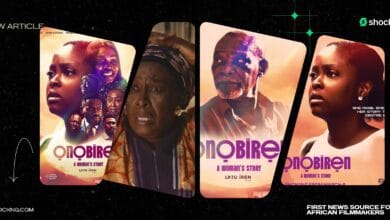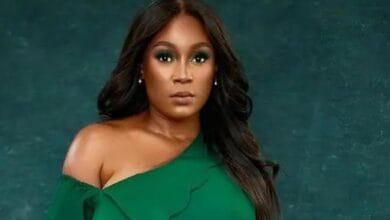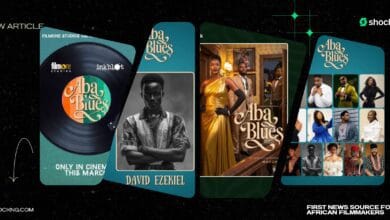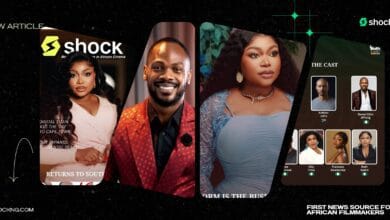The Story⚡
“When you have a willing actor in the hands of a good director, magic is what you will get.” Read on to uncover what it truly meant to bring Efemini Edewor alive on screen.
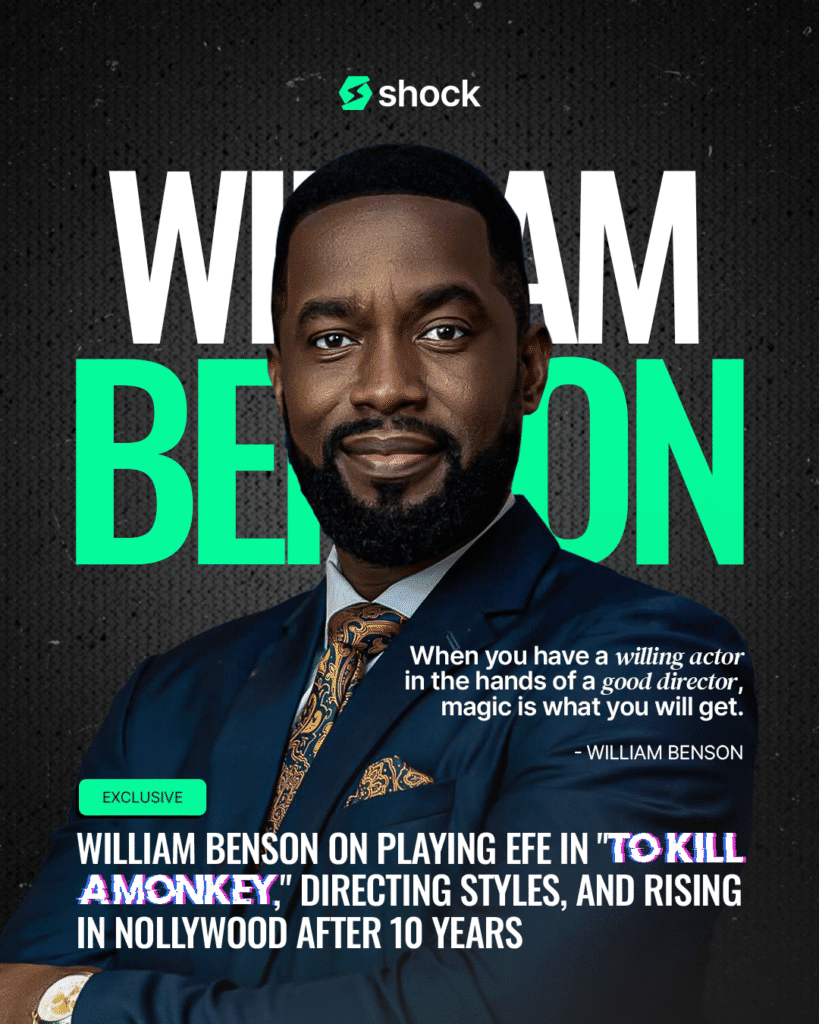
Tell Me More
Back on January 18, 2023, Kemi Adetiba announced that she and her production team were still searching for the perfect actor to play Efemini Edewor in To Kill A Monkey. In her words:
“There’s this character in TO KILL A MONKEY we’ve had no luck auditioning for.
We’ve had reads from accomplished actors, tried broadening our search with open auditions. Still, no one sparks for this character. I haven’t seen MAGIC yet for ‘Efemini Edewor.’”
Fast-forward to 2025, and that role has finally found its match in none other than William Benson.
In this exclusive interview, William opens up about stepping into the shoes of Efemini—what the character meant to him and the journey of bringing him to life on screen.
Let’s dive in.
How did you prepare to play Efe’s complex, desperate character, and what personal experiences do you think actually shaped this portrayal of this particular character?
So, my preparation for Efe stemmed from the very first day I got a call from Kemi Adetiba. I’m a very passionate person when it comes to my work. I received a call, and I was told that Kemi had been trying to reach me. I said, “Kemi? How?” I checked, and I saw four missed calls from someone I’d been hoping to work with. She had once asked me to interview sometime back before King of Boys started, but she didn’t like my audition.
Now, believe it or not, and to be honest, I hate auditions because I don’t get to express myself very well. I’m a very collaborative person when it comes to acting, and if I’m playing against someone that I know might be a possible choice in the film, we’ll draw from each other’s energy.
So, once I called her and she picked up, we got talking. We talked for almost an hour and thirty minutes. I was listening to the way she was talking about her film. It was just like when a child is given candy, and the child moves around the candy and talks about the candy: “It’s so sweet, isn’t it?” And she was on and on, and you could see so many visions.
That alone got me, and I said to her when we finally met, “Look at me. Yours I am. Do with me what you will.”
So, I released myself to her. Kemi is a visionary. She is somebody who knows what she’s doing—somebody who knows what she wants and what she does not. She took me there, actually. She knows how to get what she wants out of her actors. So, my preparation was so easy. I would say my preparation was 10%, and Kemi’s was 90%. When you have a willing actor in the hands of a good director, magic is what you will get.
Going to your background, you studied theatre at the University of Lagos, right?
No, no, I didn’t study theatre. Rather, I trained as a theatre person. I was in secondary school when I did my first play. A man came into the school to speak to us. He said he wanted to do drama. He was the one God used to open this door for me.
It was probably in my final year in secondary school when he came, and we did a play on Fela, where I played Fela. And from that moment on, I got the tag “Baba 70.” So, that inspired me.
Then another guy came and said there was a group at a church in Maryland called Jaff Production. And I went there and joined them. The first play we ever did there was The Wedlock of the Gods by Zulu Sofola. From that moment on, I moved on again. I met another one, who carried me to the person who set me up, who is known as Isaac John Asanya. That was where I got my full training as a theatre actor. And after that, I got involved with Theophilus Akatugba, a film director and producer. I did Blood on My Hands.
So, after that, I ended up joining Yodrack Play House, which introduced me to a theatre academy at the University of Lagos. The man who was handling it at the time was also handling a class in the English department. His name is Williams. He was the one who gave me the opportunity to direct a play with a couple of people. That was how I started directing. I started directing plays at the University of Lagos while I would still act. And I realized that from the time I started in 2003, I’d been helping students graduate from the university. So, I said to God that I also need to go to school. I can’t be churning people out as educated while I’m without a certificate.
Then one day, when we were having an overnight, I stood in the main auditorium, and I prayed to God to help me out. And I heard strongly in my spirit, “This school you will go to, and that which you need, I have provided.” The following week, I was reading Punch newspaper, and I saw university admissions. I applied for it, and that was how I got into the English department at the University of Lagos. I studied English and majored in Literature. Whilst I was doing that, my classmates didn’t know that I was with them, because they saw me more in the theatre department, which is why, I guess, you must have thought that I studied theatre.
I graduated in September 2010. Whilst I was there also, I encountered Tunde Kelani, with whom I did Campus Queen. I also got involved with the BBC radio drama called Story Story: Voices for the Market. We pushed Story Story from the same year I entered school up until 2021, after COVID. It was a radio drama that had its own style, not your usual in-box radio drama studio. We built the whole set, like a film set. That’s why I would say I’m versatile in all the genres of drama.
Now, looking at this background of yours, how would you say it influenced your approach to showing Efe’s vulnerability and growth?
I would say my society, Nigeria, did that. I’m an avid student of current affairs, society, and our world generally. I binge on stories. I binge on information and even what you call conspiracy theories. I study it more than any other person, and I’m comfortable understanding that conspiracy theory, on its own, no matter how you say it’s a conspiracy, there’s an atom of truth in it.
I understand the mindset of people in that environment. Then, when you talk about crime, you read about it every day in the newspaper. You see it on television, and it happens around you as well. So, for me, once I begin to see all these things as an actor, I take them, master them, and lock them up in my acting philosophy, which is encapsulated in four letters: R-A-P-P — Research, Analysis, Practice, Performance. Once I carry that on my shoulders, I run with it. And I always get to the place where I operate from the ground up.
Three alphabets: X, Y, Z. X, the character. Y, what does the character want? Z, what is stopping the character from getting it? From that moment on, the conflict builds, and you don’t know what will happen again. That brings me to the place where, when I carry all these experiences and bring them forward, I get to that place where, when I finish reading the script, I don’t just do anything I’ve read in the script. Once I enter my main state, I weigh the energy of my collaborating actor, and I get into the zone of collaboration, which is what I’ve always wanted in the film and theatre industries.
Every time we do drama, I hate competitions. Competition only stifles or becomes a catalyst for something we cannot control. Collaboration, on the other hand, builds a beautiful environment and synergy, which is what we saw in To Kill A Monkey, with a great mind like Kemi Adetiba at the forefront handling it, and with Remi Adetiba, who is making sure that everything goes on seamlessly with the crew. There was total collaboration on all levels when we were shooting To Kill A Monkey.
I’ve known Bucci for a little bit back, but we hadn’t met then. However, we were looking at each other’s work. Whilst I was looking at his, he was looking at mine. And by the time we were finally going to work together, he said, “Let’s meet.” We sat down, talked, ate, and drank. But the beautiful part of it all was that, whilst we were there doing all that talk, we were tapping into each other’s energy, which you could see a reflection of in what we did with To Kill A Monkey.
And the most beautiful part is that Bucci is in a class of his own. I am in a class of my own. And we are brothers aside from film. There is so much love running between all of us. The place where people do analysis and talk about one person being better than another is out of it for me. Everybody is playing a character. The character is the essence of your analysis or criticism, because the character Efemini cannot play beyond what Efemini is playing. That is his character. Criticism should be in line with characterization, and not affinity or love for the individual.
To Kill a Monkey is a very intense film, right? Which of the scenes was the hardest for you to film, and how did you prepare for it?
The hardest for me flowed from the point where I opened up to Oboz about what was going on with me. That part where he said, “I take God beg you, cut soap for me.” All the scenes in that house taxed me a lot because everything was anchored on me. It was quite demanding. That day, the lines wouldn’t stick. I fought it tooth and nail to make sure that it happened. Even the director was a little bit upset. I knew that something was happening because anytime I step on set, before I do anything, I ask the Holy Spirit to take control, to guide me. So, if the Holy Spirit is guiding me, sometimes I want to get in His way, but He shakes me in a particular way.
But if I relieve myself to Him, it will go seamlessly. In your own mind, you think you’re not doing anything. Kemi was a bit upset that day, but the next day, she came back and said, “I’m very sorry. I think I was overwhelmed.” And the moment she said it, I almost shed tears again. I didn’t tell her though. I love the woman, and I love her energy. I love her work. To Kill a Monkey is Kemi’s baby. She carries it with everything inside her.
Looking at Kemi Adetiba’s previous works, it’s very clear that she focuses on cultural authenticity. How did you make Efe relatable within this cultural context?
So, I didn’t do anything. I’m Nigerian, to be precise. Kemi Adetiba is Nigerian. Kemi Adetiba wrote the series. Kemi Adetiba directed the series. The person who has the vision is the one creating it. I can write a play now, and you direct it, but you cannot have my vision. I was just a tool in the hands of a ready user. And the environment where I come from added value to it.
The environment where I come from, in the universal context of history, is a human being that has been eroded with so much heaviness that it shrinks its reality because of the state of its mind. And you see that in the reflection of who we are as a people. When you don’t have money, it humbles you. This is the case of Efemini. He has lost his humanity. When you lose your humanity, you have no essence anymore. Even if the essence is there, you can’t find it. So, you need a catalyst like Oboz to bring it up. This is what Oboz did in the restaurant.
For the first time in Efe’s life, somebody is seeing him. That was the denouement point for him that made him shed tears. And nothing else could have done that. It’s our society.
What message do you think Efe’s story conveys to the audience?
Efe’s story conveys multidimensional things that prevail in our society, which is from grass to grace. And if it’s not well managed, it becomes from grass to grace and grace to grass. Just like the Bible says, “When you help people, do not expect them to help you back,” Efe is selfless. He thinks of his family. He thinks of every other person. He’s always carrying everybody’s weight. He’s carrying the weight of burying his mother. He’s carrying the weight of his wife’s labor. However, everywhere he goes, everybody is hitting hard at him. The lesson we learn is that no matter how you help people, you also need to help yourself.
The Bible says, “Love your neighbor as you love yourself.” You must first love yourself before you can have enough love to love people. You must first carry yourself before you have enough energy to carry people. But if you try to carry people when you haven’t carried yourself, you will drown. And that was what was happening to Efe.
The same thing happened to me. I lost my mom and my dad in the same month in 2020. I went to the village to bury them, and the people there said that because we hadn’t been to the village before, we had to bring cows. To Kill a Monkey is a thorough representation of every aspect of our society, and Kemi did her homework in researching. This gave birth to the beautiful story that we have now.
What do you do for fun when you’re not working?
I’m an avid reader. At the moment, I’m juggling The Iroko Man and the Wood Carver, Soyinka’s Child Internationale, and Femi Osofisan’s Midnight Hotel. I also enjoy good food and cooking. If I’m not in the kitchen, I’m probably at a restaurant with a book in hand. And above all, I love traveling.
What character in Nollywood are you hoping to play soon?
I don’t have a fixed character in mind, but I draw inspiration from two actors who’ve mentored me from afar: Denzel Washington and Samuel L. Jackson. They’ve taught me versatility and depth, lessons I’m eager to apply to every role I get. I don’t want to be boxed in. Directors should feel free to stretch me. Don’t judge an actor by a single film. You never know what he can do in a different context. I’m open to all kinds of roles in Nollywood, and eventually, beyond. I’m not trying to become my mentors, but I want to embody the principles they represent.
What is your acting philosophy, something you’d pass on to aspiring actors?
Two things. First: RAPP. Second: “If you know from where thou comest, there is no limit to where you can go.” When hunger drives you, you stay grounded. The journey becomes an adventure, and when God is part of the orchestration, as Alpha and Omega, the doors open. He gives the seed, but you must plant and nurture it. If I hadn’t embraced the process, I wouldn’t be here today. So whatever you do, start with God, walk with Him, and end with Him. Read, observe, prepare. Love God, love the craft, and do the work. With that, not even the sky can limit you.
In Summary
Since its release on Netflix on July 18, 2025, To Kill a Monkey has consistently held the number one spot on the platform’s charts. The show continues to captivate audiences and is still available for streaming, so if you haven’t watched it yet, now is the perfect time to experience the magic for yourself.

Thanks for Reading.
Shockng.com covers the big creators and players in the African film/TV industry and how they do business.
Let’s be friends on Instagram @Shockafrica
